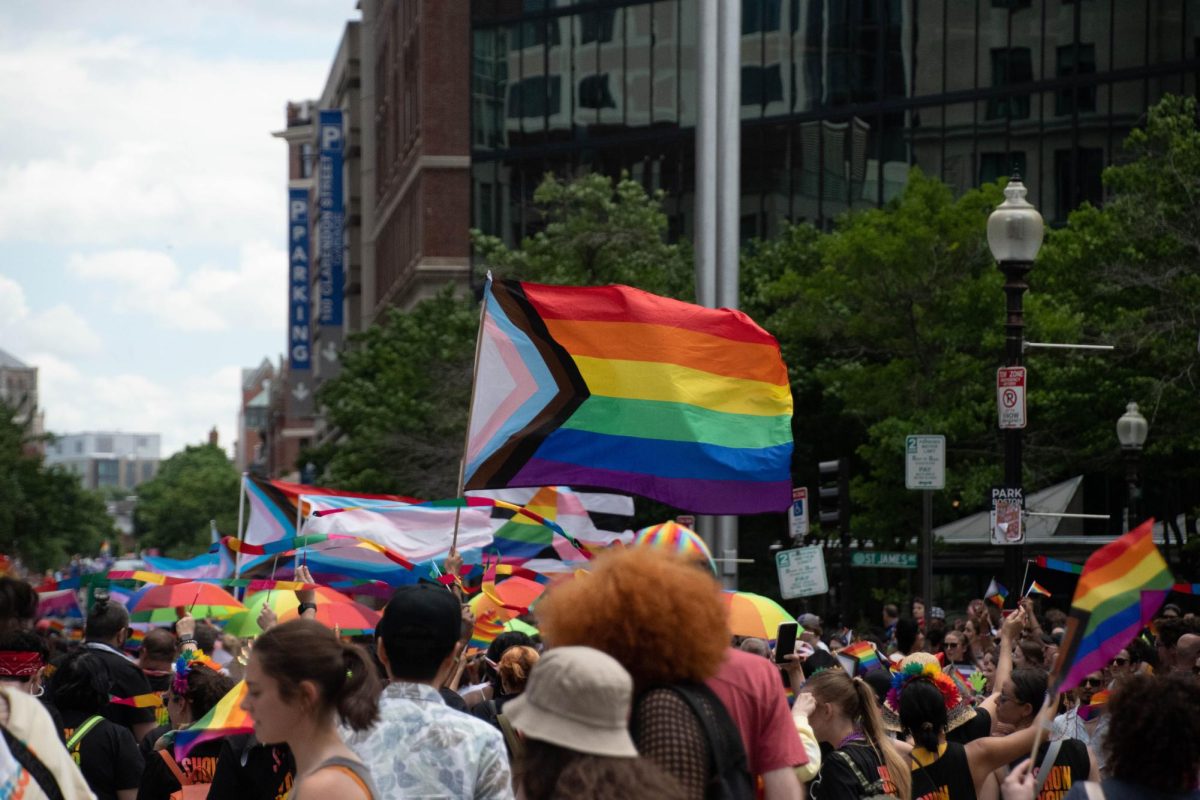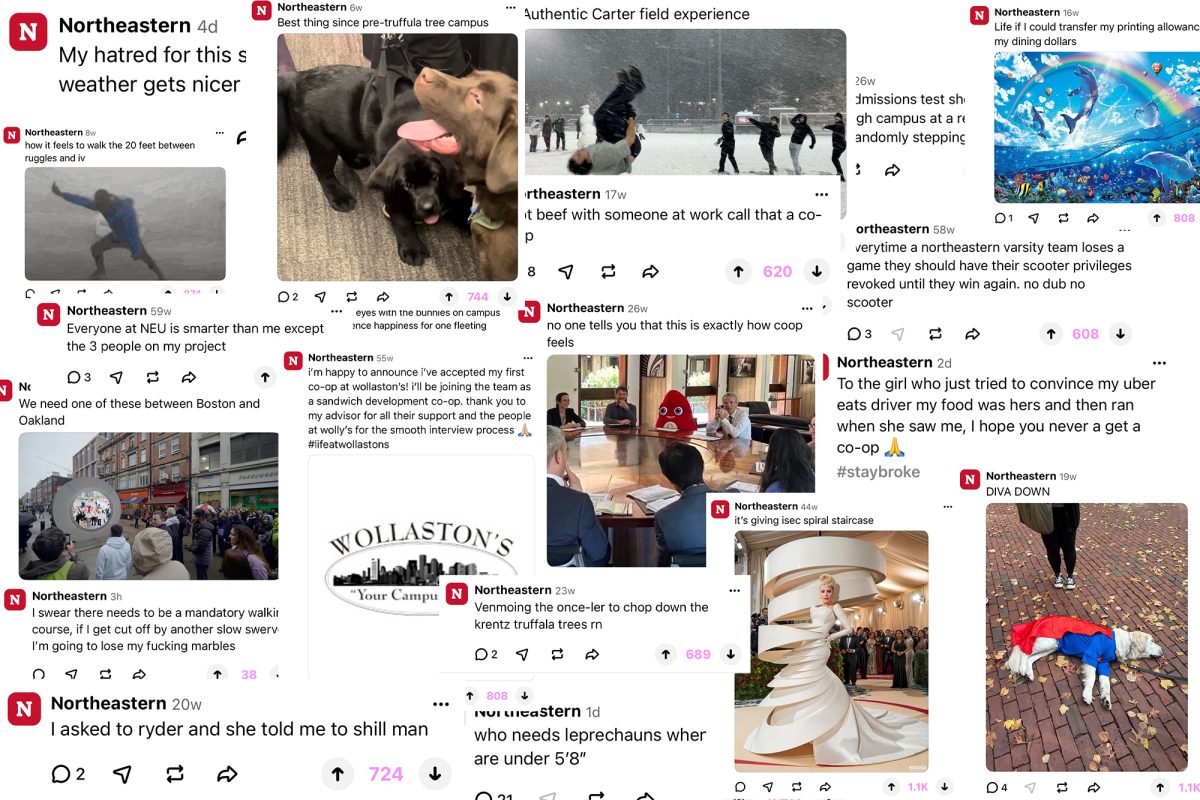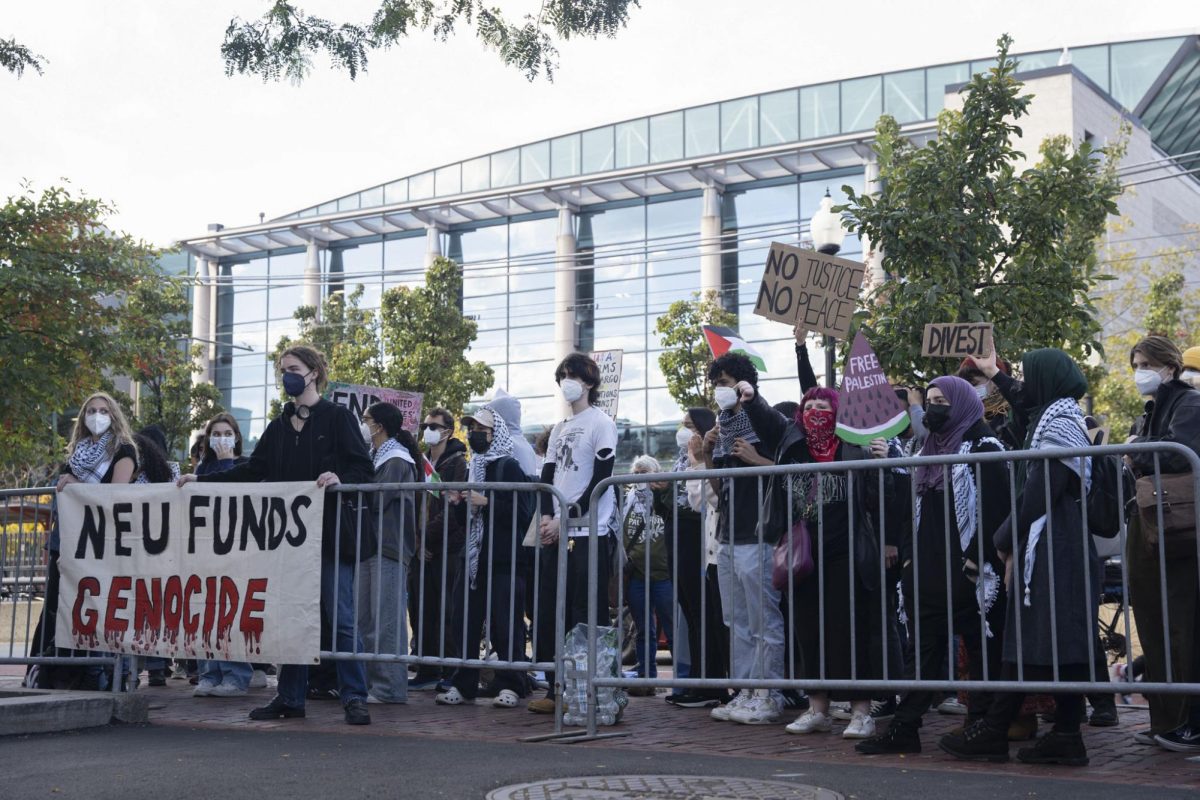Megan Moffat, a fifth-year behavioral neuroscience major, watched the Jan. 20 inauguration live. When President Donald Trump announced in his speech that he would only recognize two genders, they collapsed.
“My partner just covered me as I sat there in silence and mourned,” said Moffat, who is co-president of the Out in STEM at Northeastern University club, or oSTEM, which prepares LGBTQ+ students for success in science, technology, engineering and math.
Since taking office, Trump has taken several actions to restrict transgender Americans’ participation in athletics and the military and how they identify on official federal documents. Through executive orders, Trump has taken away the option for non-binary Americans to identify as “X” on official documentation, attempted to remove all transgender people from the military and signed an executive order banning trans women from competing in women’s sports. LGBTQ+ students and staff at Northeastern fear repercussions for their identities as federal policies become further reaching.
“This is really about our human rights here, about existing as trans Americans, as people in our true and complete identities,” said Kylie Bemis, a transgender assistant teaching professor at the Khoury College of Computer Sciences.
Boston City Council designated the City of Boston as a sanctuary city for LGBTQ+ people March 12. This means taxpayer-funded agencies “will not comply” with federal efforts to hurt the healthcare, housing, education or employment rights of people who identify as LGBTQIA2s+.
Councilor and leader of the bill, Liz Breadon, who was the first openly gay woman elected to the council, expressed how the current political climate made it necessary for LGBTQ+ people to have “sacred spaces” at the meeting where the resolution was formally passed.
“In this moment in time, our trans community is under incredible political pressure, especially from the government,” Breadon said at the March 12 meeting. “They’re really going after marginalized communities of all kinds, but especially the trans community.”
Moffat, who organizes events for LGBTQ+ students in STEM, said event attendance has risen as students grow more fearful of the Trump administration’s actions.
“Every event that we have thrown, you can tell from the energy that people need it — a space to either express their queerness or to just see other people expressing their queerness,” Moffat said.
During a February meeting, Moffat recalled a younger student asking nervously how they would approach being gay at co-op, with concern and worry that she “will never forget.”
“It’s hard to hear people who are only three or four years younger than me really fearing for their identities,” Moffat said. “I found my identity [in college] because it was finally open to me, and now people are coming into college and the world is closing them out.”
The word “trans” has been taken off all government websites, including the famous Stonewall National Monument website, which commemorates a series of 1969 riots after a police raid that marked a turning point in LGBTQ+ history.
“It’s really this complete attempt at erasure of trans people from public life that has such dire consequences for our lives, regardless of whether we can legally get care or whether we legally have our identities acknowledged, just this complete erasure of us from public life,” Bemis said.
Moffat feels like the news can be overpowering, snowballing to a point where individuals can’t process it all.
“It’s a fear combined with helplessness,” they said.
Bemis wrote an open letter Feb. 22 to the Northeastern community urging university leadership to ramp up efforts to protect faculty and students against the onslaught of anti-LGBTQ+ policies from the Trump administration. Four days later, Northeastern updated its “Navigating a New Political Landscape” FAQ page to include statements on safeguarding LGBTQ+ rights across its global network.
“Northeastern remains committed to providing a living, learning, and working environment free from discrimination and harassment for all members of our community,” the FAQ page reads.
Through a Jan. 20 executive order titled “Defending Women From Gender Ideology Extremism and Restoring Biological Truth to the Federal Government,” Trump ordered all “government-issued identification documents, including passports, visas and Global Entry cards” to reflect a person’s sex assigned at birth.
“I think [the website] probably needs to be worded a bit more strongly in cautioning any trans students or trans Northeastern community members about the risks when it comes to international travel or even applying for a passport right now,” Bemis said.
Lokesh, a computer science and behavioral neuroscience combined major who asked to be identified by their first name only due to concerns about their privacy, hopes to see the Democratic party defend trans rights, something the party has not always been aligned on.
“At the federal level, the Democrats need to obstruct, obstruct, obstruct. You need to constantly violate the decorum,” Lokesh said.
Max Rizzuto, a fourth-year data science and philosophy combined major, is worried about federal leadership ignoring medical associations’ decisions on gender-affirming care.
“I think it’s really despicable that we have people in office who are more interested in securing their own power than protecting the lives of queer folk and children and who are happy to override the recommendations of doctors and every medical association for gender affirming care,” they said.
Lokesh said they believe Americans have become increasingly hostile towards trans advocacy issues over the last decade.
“[Americans have] normalized these hateful positions and because [Americans] normalized them, cutting related programs and demonizing trans and queer people is permissible,” Lokesh said.
As a parliamentarian of Northeastern’s chapter of Young Democratic Socialists of America, or YDSA, Lokesh said they hope Americans will turn to local advocacy groups to seek support. YDSA is preparing for protests and is aggregating information from professors on how professors can help subvert grant cuts.
Bemis said she sees right-wing attacks on trans rights as “genocidal.”
“There’s a lot of fear and uncertainty within our trans community,” Bemis said. “The cisgender Americans are going to, at some point, have to get comfortable with the word genocide or genocidal, at least, when it comes to the Trump administrations and the [Make America Great Again] movements’ rhetoric toward transgender Americans. And I know that most of us are not just concerned about our livelihoods, but our lives.”
This semester, oSTEM collaborated with the College of Science, Khoury College and Bouvé College of Health Sciences and the College of Science Diversity Committee for a March 25 event to encourage LGBTQ+ students from across Northeastern’s disciplines to network, support each other as a collective and strategize advocacy on a local level.
“I think this is a time that our queer and trans community needs vocal support, needs visible support from not just from each other, but from the rest of our community,” Bemis said. “So this is the time to fly that trans flag, fly that pride flag.”
News staff Jake Guldin contributed reporting.








![A sign reading "The People's Iftar for [Palestine]." Students held a gathering for iftar and marched down Forsyth Street March 25.](https://huntnewsnu.com/wp-content/uploads/2025/04/IftarProtest_ElizabethScholl_3-17-25_1-1200x800.jpg)



